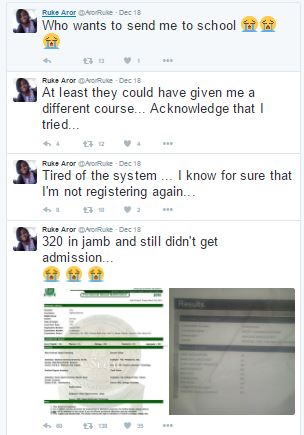
Dear parent,
As you worry about your child’s forthcoming end of secondary education terminal examinations – WAEC and JAMB if you’re in Nigeria – and prepare him/her for the examinations by paying for that extra tuition, encouraging – or should I say shouting at – the child to ‘go and read her/his book’, praying for successful outcomes, hoping for a brighter future for your young one, making promise/s of the gifts you will give your child if her/his results are brilliant; remember that enjoying the process of supporting your child’s education, seeing your child burn the midnight oil, looking into your child’s innocent eyes and seeing fear, dreams, hope, aspirations and freedom are some of the best parts of your child’s educational process in life.
Perhaps, you’re wondering about your child’s ability in Maths or English; maybe you’re wondering if your child will be able to achieve an all A’s in his examinations and study medicine, law, engineering or architecture in that dream university that you’ve always longed for. As a parent I feel you and I think it’s important to have high expectations for any child but encouraging examination malpractices shouldn’t be one of the means to achieve the goal of having an all A’s result. However, this issue of examination malpractice isn’t about you but it’s about a national issue identified by the president of Nigeria in his newly published “book”. Please read on.
So, why did I choose to talk about examination malpractices while addressing you? It’s not because you are a parent that indulges in such a reprehensible act but because in a new book “Nigeria on Firmer Ground: Towards Lasting Peace & Progress” – more like a dossier to me – recently launched by the President of Nigeria, President Muhammad Buhari, on the eve of the forthcoming presidential election (16th of February, 2019) in Nigeria, on page 93 under “Challenges” faced by JAMB, point number four is on “How to prevent parent-induced unwholesome activities to obtain illicit assistance.” It was this statement that prompted me to write this open letter to my imaginary parents. I know and trust you that you’re not one of those parents that engage in such a shameful practice but I want you to extend your noble character to other people that you know that might not see anything wrong in engaging in examination malpractices; kindly let them know that hard work pays and that there is never a short-cut to success, irrespective of how skewed some social perceptions about cheating and cheaters are.
Now, let me narrate two personal experiences when I sat for my own WAEC examinations in the early 1990s. My number one nemesis – subject wise – was English language and with an ordinary pass (P) or in a worst case scenario a failure (F) in it there was no way I would stand a chance of furthering my formal education. So, I was in panic mode in my final year in secondary school (SS3) and I wondered if I was ever going to make the least required merit level (C6) in my English language examination. Hence, I approached a friend and schoolmate, Victor Akhidenor – he won the DAME Best Sports Journalist award in Nigeria in 2016 – and I asked him to help me out; since he was always writing many pages whenever we were given essay tasks to do in school. He was generous enough to suggest to me that every week we should come up with an essay topic to write on and then we take it to our English language teacher – Mrs Amadife – who graciously accepted to give us feedback on all the independent essays we wrote, and by the time our WAEC results were released I had a C6, the first teacher I wanted to see and thank – which I did – was Mrs Amadife. That event gave me an invaluable experience in life in what it means to work hard to overcome an educational challenge.
The second experience is about a secondary school classmate, Jide (pseudonym), he was – academically -our second best student during our Junior Secondary School days and by the time we sat for WAEC in our final year in senior secondary school he had lost a bit of focus and as the examinations progress he just said one day that (not verbatim) ‘I have to prepare for my GCE in November, I’m going to fail these examinations (the May/June WAEC we were doing at that point in time) and his prediction wasn’t wrong, his WAEC results weren’t fantastic but he used the five months between the end of the WAEC and GCE to prepare. He eventually had a good GCE results; went on to study Economics at the University of Ibadan and came out with a second class upper (2:1). So, failure now doesn’t mean failure forever. What is important is to learn from failures and put in place practicable strategies to overcome the challenges that led to the failure in the first instance, and also it is important to encourage children and young people to always put in their best efforts in whatever they’re doing – remember the difference between an Olympics 100 meters champion and the person that comes last in the final race is always less than one (1) second.
Lastly, irrespective of the situation that a child is in in his/her education, you as a parent or an adult in the life of that child can make immense positive contributions to the educational experience of that child or young person. Help the child to create a daily but simple study routine or habit. For instance, you can:
- Create a study timetable with the child.
- Focus on critical subjects that the child needs statutorily for further education, i.e. Maths and English.
- Focus more on the subjects that the child is struggling in and consolidate on the ones that he/she is already excelling in
- Tap into your wealth of human resources around you, i.e. family friends to help out with extra tutoring.
- Get accessible study materials for the child, e.g. JAMB and WAEC study packs.
- Create a dedicated study time for the child, i.e. 1 hour daily.
- Don’t overload the child with unnecessary and unproductive tasks, i.e. extra coaching after school for additional 3 hours.
- Reward the child’s efforts, i.e. after the daily 1 hour home-study time let your child play, relax etc.
- Avoid comparing a child with another child. You wouldn’t want anyone to compare you with another person in a negative manner, so, please don’t do that to a child.
- Support your child in developing hobbies, e.g. cooking, writing, gardening, sports, painting etc.
I wish you and that child in your life the very best.
Please, leave your thoughts on this post in the comment section and feel free to share the article/podcast with your contacts.
Thanks for taking out of your precious time to read/listen to my article/podcast!
If you like this post, kindly subscribe and/or follow me on Twitter @otukogbe and @EdusoundsNg or on Facebook at edusoundsng.




